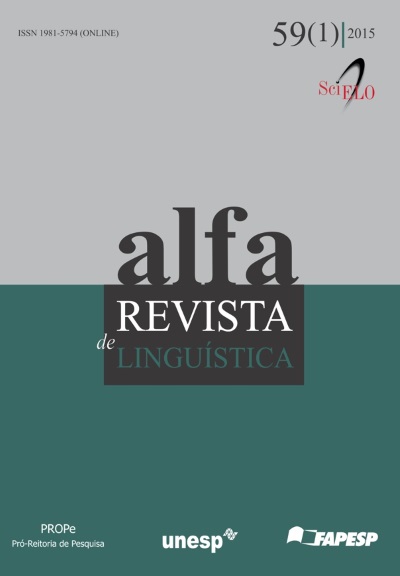The development of modalized expression pode ser: a case of (inter)subjectification in portuguese
DOI:
https://doi.org/10.1590/1981-5794-1502-2Keywords:
Modalization, Pode ser, (Inter)subjectification, Functionalism,Abstract
Based on a functionalist approach, this paper analyzes the modalized expression ‘pode ser’ as a complement-taking predicate which embeds a proposition (pode ser1) and as an independent structure (pode ser2), in contemporary written and spoken Brazilian Portuguese texts. We aim to identify degrees of (inter)subjectivity, revealing a process of (inter)subjectification (TRAUGOTT, 2010 among others). The analysis carried out in this paper is supported by parameters of (inter)subjectivity of modal elements (Traugott; Dasher, 2002) and by the notion of modality as a multifunctional category, serving not only to encode the speaker’s attitude regarding the modalized content, but also as a pragmatic strategy, as a regulator of communicative situation. The exam reveals ‘pode ser’ as a strongly demanded structure in interaction, a fairly requested set and also productive and useful for interpersonal relationships. The examination of semantic, discursive and morphosyntactic properties indicates a shift from syntax (pode ser1) to discourse (pode ser2), interpreted as a development of (inter)subjectificationDownloads
Download data is not yet available.
Downloads
Published
23/02/2015
How to Cite
SOUZA, C. N. de. The development of modalized expression pode ser: a case of (inter)subjectification in portuguese. ALFA: Revista de Linguística, São Paulo, v. 59, n. 1, 2015. DOI: 10.1590/1981-5794-1502-2. Disponível em: https://periodicos.fclar.unesp.br/alfa/article/view/6177. Acesso em: 2 mar. 2026.
Issue
Section
Papers
License
Manuscripts accepted for publication and published are property of Alfa: Revista de Linguística. It is forbidden the full or partial submission of the manuscript to any other journal. Authors are solely responsible for the article's content. Translation into another language without written permission from the Editor advised by the Editorial Board is prohibited.

